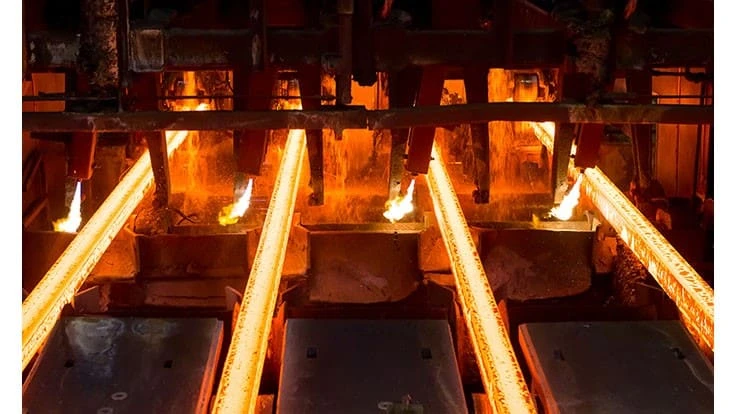
Photo courtesy of ArcelorMittal.
Iron ore and steel prices in several regions around the world have been falling in August, potentially signaling some softness in what has been a historically pricey ferrous scrap market.
Steel production cutbacks in China’s blast furnace/basic oxygen furnace (BF/BOF) steel industry sector are being cited as the lead factor in falling iron ore prices.
An Aug. 19 online item by MarketWatch.com refers to 30 percent drops in iron ore futures contracts trading in mid-August on the CME exchange half a world away in the United States.
A combination of mandatory emissions cuts and uncertain economic conditions in China caused that nation’s steelmakers to make about 5.6 percent less steel in June of this year compared with the month before. That is according to figures reported by a Chinese steelmaking association to Brussels-based World Steel Association.
The story of Chinese BF/BOF steelmaking this century has been one of monthly and annual output numbers that increase significantly with few interruptions.
However, iron ore prices face “strong headwinds given China’s interest to go ‘greener’,” according to one analyst MarketWatch quotes. The analyst also notes a ferrous scrap futures contract might soon be introduced on the Dalian Commodities Exchange in China, as that nation’s government encourages steel mills to use more scrap in its furnaces.
Economically, although Chinese manufacturing output and retail activity monthly figures have shown signs of growth this summer, the figures also have come in below analyst expectations. Despite keeping its COVID-19 cases to a minimum, concerns have mounted about the government’s willingness to instantly and severely regulate entire industry sectors (something recyclers have experienced already).
Lingering corporate and regional government debt concerns also linger in that nation, with property developer and aspiring conglomerate Evergrande being one of the most recent companies to be called in for consultations with the Beijing government. The fate of Evergrande might also be tied to a Chinese apartment tower market that some observers have been calling overbuilt for nearly a decade.
Steel prices and futures contracts also are showing signs of weakness in some nations. United Kingdom-based information services firm Kallanish Steel reports that steel billets made in ASEAN (Association of Southeast Asian Nations) countries like Vietnam have been falling, based on reduced demand from China. Kallanish also says finished and semi-finished steel exporters in Turkey and India are faced with reduced demand in August.
In the first two weeks of August in the U.S., weekly raw steel production fell by 0.2 percent compared with the week before, according to the Washington-based American Iron and Steel Institute (AISI). That does not necessarily signal a new trend, but it could tie into a slowdown in new construction projects in the U.S. and ongoing microchip shortages within the U.S. automotive industry.
The global question marks might have contributed to softening ferrous scrap prices in the U.S. export market in early August. Surveyed pricing from Fastmarkets AMM showed a $40 per ton drop in bids for No. 1 heavy melting steel (HMS) bulk shipments off the East Coast in early August compared with early July.
A steel industry in China that is scaling back would not necessarily make an immediate impact in the U.S. According to AISI, which cites U.S. Census Bureau data, China is behind South Korea, Japan, Turkey, Vietnam and Taiwan as suppliers of imported steel in 2021.
However, the ripple effect of scaled-back steel output or consumption in China would likely result in more overseas steel seeking a home in the U.S., and the potential for declining steel (and eventually scrap) prices globally.
Latest from Recycling Today
- Reconomy brands receive platinum ratings from EcoVadis
- Sortera Technologies ‘owning and operating’ aluminum sorting solutions
- IDTechEx sees electric-powered construction equipment growth
- Global steel output recedes in November
- Fitch Ratings sees reasons for steel optimism in 2025
- P+PB adds new board members
- BlueScope, BHP & Rio Tinto select site for electric smelting furnace pilot plant
- Magnomer joins Canada Plastics Pact





